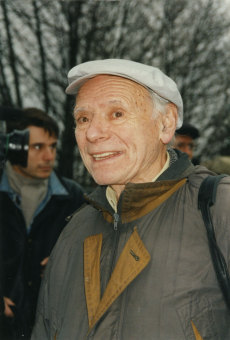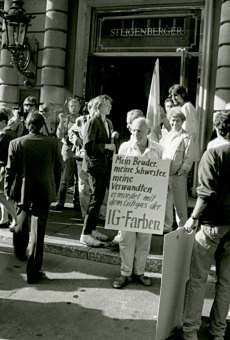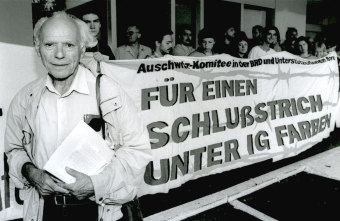Peter Gingold (1916–2006)

© Fritz Bauer Institute (Gingold papers)

© Fritz Bauer Institute (Gingold papers)

© Fritz Bauer Institute (Gingold papers)
Peter Gingold, the son of a tailor in the ready-made clothing industry, was born in Aschaffenburg in 1916. He attended a Jewish grade school and began a commercial apprenticeship in 1930. The same year, he joined a union, the Zentralverband Deutscher Angestellter (Central Association of Salaried German Employees), and one year later he became a member of the Kommunistischer Jugendverband Deutschlands (KJVD, Communist Youth League of Germany). His entire family was politically active. After 1933, Peter Gingold had to continue his antifascist resistance work illegally; his parents and siblings emigrated to France. He followed them there several months later, after being arrested in an SA raid and expelled from the country.
In France, he worked for the German-language antifascist daily Pariser Tageblatt. In 1936, with other young German antifascists, he founded the Freie Deutsche Jugend (Free German Youth) in Paris, and met Ettie Stein-Haller, his future wife, there. They married in January 1940, and their first daughter, Alice Gingold, was born in June 1940.
After the German Wehrmacht occupied Paris in 1941, Peter Gingold had to give up his activities there, as the Gestapo was searching for him. He went to Dijon and became active in a French Resistance group that distributed antifascist leaflets among the German soldiers to induce them to defect. In 1942, two of his siblings were arrested in Paris and deported to the Auschwitz concentration camp. They did not survive. One year later, in 1943, the Gestapo also arrested Peter Gingold, interrogated and tortured him, and conveyed him to Paris, where he succeeded in escaping from captivity. In August 1944, he took part in the uprising to liberate Paris and went to Lorraine to participate in the fight for liberation there. In late April 1945, he was fighting with the partisans in northern Italy when the area was liberated.
Peter Gingold returned to Frankfurt am Main in August 1945 and, along with his wife, Ettie, resumed his involvement in the Communist Party of Germany (KPD). Their second daughter, Sylvia Gingold, was born in 1946.
As a participant in the résistance, he was officially honored in France and Italy, but in the Federal Republic of Germany he was repeatedly vilified because of his KPD membership and even had to fight for recognition of his German citizenship.
After the founding of the German Communist Party (DKP) in 1968, Peter Gingold held membership there and occupied various official positions. Among other things, he was politically active in the Association of Victims of the Nazi Regime/Union of Antifascist Men and Women (Vereinigung der Verfolgten des Naziregimes – Bund der Antifaschistinnen und Antifaschisten, VVN-BdA), in the Association of Germans in the Résistance (Verband Deutscher in der Résistance), in the Auschwitz Committee, the coalition formed in opposition to I.G. Farben, and in peace initiatives.
Until his death in 2006, Peter Gingold fought “against old and new Nazis,” took part in demonstrations against neo-Nazi parades and rallies, and also visited countless school classes and youth groups to talk about his experiences under fascism and in the war and his work in the resistance movement.
In 1991, Peter and Ettie Gingold were awarded the Johanna Kirchner Medal by the City of Frankfurt am Main for their opposition to the Nazi dictatorship. On December 12, 2004, he was presented with the Carl von Ossietzky Medal in Berlin by the International League for Human Rights. He died in Frankfurt am Main in 2006 and was buried in Paris.
(SD; transl. KL)
















